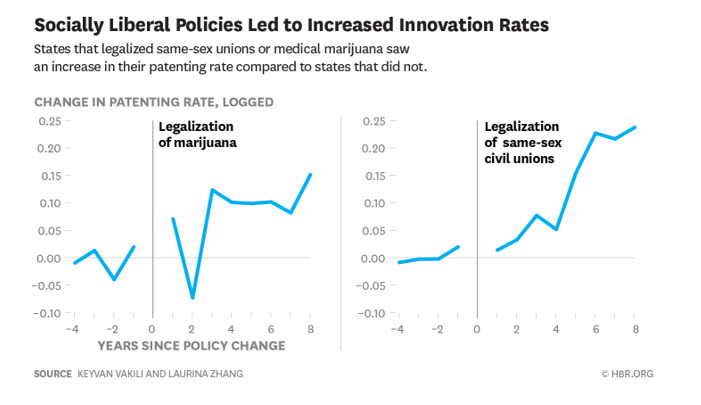Study Says Cannabis Legalization Is Good For Innovation
Cannabis Legalization Leads to Medical Innovation in Legal Marijuana States from CannabisNet on Vimeo.
Want more proof that cannabis legalization is good for society and the economy?
A new study released reveals that liberal social policies such as the legalization of medical cannabis has been tied to better innovation output.
The study, called High On Creativity: The Impact of Social Liberalization Policies On Innovation, revealed that in US state with more relaxed policies towards medical cannabis use, there has been an observed 22% more new collaborations among individuals, as well as an improvement in innovation rates.
The study was carried out by two researchers; Laurina Zhang from the Georgia Institute of Technology, and Keyvan Vakili from the London Business School. The pair analyzed influences of specific state-level liberal policies on the rate of innovation: legalization of medical cannabis, same-sex marriage, as well as one anti-liberalization policy – the passing of abortion constraints.
The researchers chose the United States as the location of the study because states have flexibility in deciding their own laws. Contrasting and multiple policies were also chosen to make sure that the findings were not solely driven by just one. They also defined social liberalization as the state when governments ease their restrictions.
Innovation output was measured in terms of the quantity of patents granted in US states from the time between 1990 and 2007. These figures were compared to the values of each state’s social policy landscape in the same period. The researchers found that states where cannabis was legalized for medical use, or where same-sex marriage was legalized, experienced a surge in patenting rates compared to states with no such laws in place. They also found that when the anti-liberalization policy was implemented, this was linked to a decrease in patenting. The two social liberalization policies were associated with a 5-6% growth in innovation output, while abortion restrictions resulted in a 1% decrease in innovation output.

“The results suggest that liberalization policies can increase collaboration diversity of inventors, and hence, the rate, novelty, and impact of their innovation output, through promoting more liberal views and more openness to diversity,” reads the study summary.
Zhang and Vakili also referred to Silicon Valley in California as an example. They described it as a place that has been able to “achieve the levels of innovation” that is unparalleled. They also state that initiatives such as tax credits for research and development, intellectual property support, and public grants do not match the benefits of implementing social policies when it comes to innovation impact. California was the first state to ever legalize medical cannabis use back in 1996, and it is also one of the first states to permit same-sex marriages; thus, the spawn of innovation.
“Most innovations are the outcome of combining previously disconnected ideas,” write the researchers.
“Scientists constantly borrow ideas from each other, recombine them in new ways, and build new theories. For ideas to flow and collide, the people who hold those ideas need to meet, mingle, talk, and share. Individuals with more diverse social interactions are exposed to a more diverse set of ideas, and thus have more opportunities to produce innovations from combining previously unconnected ideas.”
In an article written by the researchers on Harvard Business Review, they also explain that states with social liberalization policies revealed an increase of 22% and 17% in collaborations, which means that inventors tend to work more with people they didn’t work with before. They also revealed something interesting: the impact of innovations produced following the implementation of social liberalization policies were more significant.
The researchers recommend that policy makers consider social policy if they are interested in motivating innovation in their area. They also suggest that executives should think about where to place their business geographically, because they need to consider what the social regulations are, as well as the business regulations. “Social policies complement economic policies,” write the researchers. Economic policies are responsible for designing the appropriate incentives, while social policies birth the context. Managers who are interested in promoting more innovation in their companies should also think about this, because a workplace where employees can meet more diverse people while sharing their ideas have the ability to “truly unleash their innovation potential.”
Study Says Marijuana Legalization Is Good For Innovation from CannabisNet on Vimeo.
OTHER STORIES YOU MAY ENJOY...
CANNABIS.NET TALKS WITH ANDY WILLIAMS OF MEDICINE MAN, CLICK HERE.








